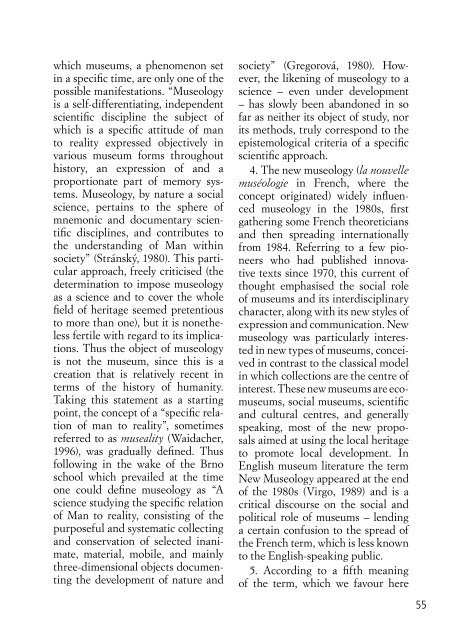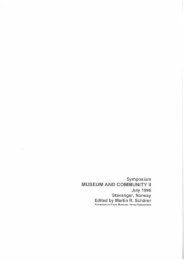Key Concepts of Museology - ICOM
Key Concepts of Museology - ICOM
Key Concepts of Museology - ICOM
You also want an ePaper? Increase the reach of your titles
YUMPU automatically turns print PDFs into web optimized ePapers that Google loves.
which museums, a phenomenon set<br />
in a specifi c time, are only one <strong>of</strong> the<br />
possible manifestations. “<strong>Museology</strong><br />
is a self-differentiating, independent<br />
scientifi c discipline the subject <strong>of</strong><br />
which is a specifi c attitude <strong>of</strong> man<br />
to reality expressed objectively in<br />
various museum forms throughout<br />
history, an expression <strong>of</strong> and a<br />
proportionate part <strong>of</strong> memory systems.<br />
<strong>Museology</strong>, by nature a social<br />
science, pertains to the sphere <strong>of</strong><br />
mnemonic and documentary scientifi<br />
c disciplines, and contributes to<br />
the understanding <strong>of</strong> Man within<br />
society” (Stránský, 1980). This particular<br />
approach, freely criticised (the<br />
determination to impose museology<br />
as a science and to cover the whole<br />
fi eld <strong>of</strong> heritage seemed pretentious<br />
to more than one), but it is nonetheless<br />
fertile with regard to its implications.<br />
Thus the object <strong>of</strong> museology<br />
is not the museum, since this is a<br />
creation that is relatively recent in<br />
terms <strong>of</strong> the history <strong>of</strong> humanity.<br />
Taking this statement as a starting<br />
point, the concept <strong>of</strong> a “specifi c relation<br />
<strong>of</strong> man to reality”, sometimes<br />
referred to as museality (Waidacher,<br />
1996), was gradually defi ned. Thus<br />
following in the wake <strong>of</strong> the Brno<br />
school which prevailed at the time<br />
one could defi ne museology as “A<br />
science studying the specifi c relation<br />
<strong>of</strong> Man to reality, consisting <strong>of</strong> the<br />
purposeful and systematic collecting<br />
and conservation <strong>of</strong> selected inanimate,<br />
material, mobile, and mainly<br />
three-dimensional objects documenting<br />
the development <strong>of</strong> nature and<br />
society” (Gregorová, 1980). How-<br />
ever, the likening <strong>of</strong> museology to a<br />
science – even under development<br />
– has slowly been abandoned in so<br />
far as neither its object <strong>of</strong> study, nor<br />
its methods, truly correspond to the<br />
epistemological criteria <strong>of</strong> a specifi c<br />
scientifi c approach.<br />
4. The new museology (la nouvelle<br />
muséologie in French, where the<br />
concept originated) widely infl uenced<br />
museology in the 1980s, fi rst<br />
gathering some French theoreticians<br />
and then spreading internationally<br />
from 1984. Referring to a few pioneers<br />
who had published innovative<br />
texts since 1970, this current <strong>of</strong><br />
thought emphasised the social role<br />
<strong>of</strong> museums and its interdisciplinary<br />
character, along with its new styles <strong>of</strong><br />
expression and communication. New<br />
museology was particularly interested<br />
in new types <strong>of</strong> museums, conceived<br />
in contrast to the classical model<br />
in which collections are the centre <strong>of</strong><br />
interest. These new museums are ecomuseums,<br />
social museums, scientifi c<br />
and cultural centres, and generally<br />
speaking, most <strong>of</strong> the new proposals<br />
aimed at using the local heritage<br />
to promote local development. In<br />
English museum literature the term<br />
New <strong>Museology</strong> appeared at the end<br />
<strong>of</strong> the 1980s (Virgo, 1989) and is a<br />
critical discourse on the social and<br />
political role <strong>of</strong> museums – lending<br />
a certain confusion to the spread <strong>of</strong><br />
the French term, which is less known<br />
to the English-speaking public.<br />
5. According to a fi fth meaning<br />
<strong>of</strong> the term, which we favour here<br />
55
















